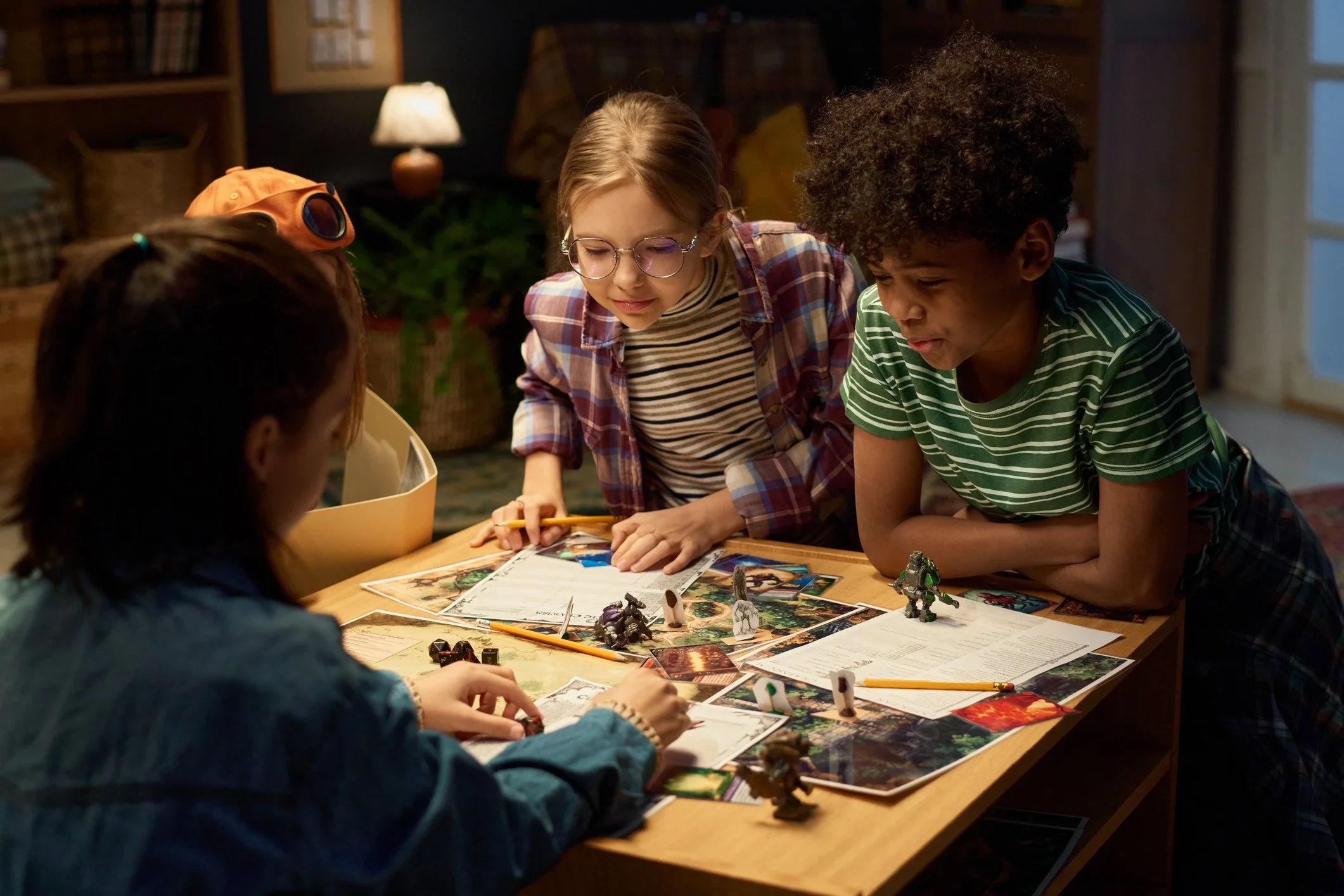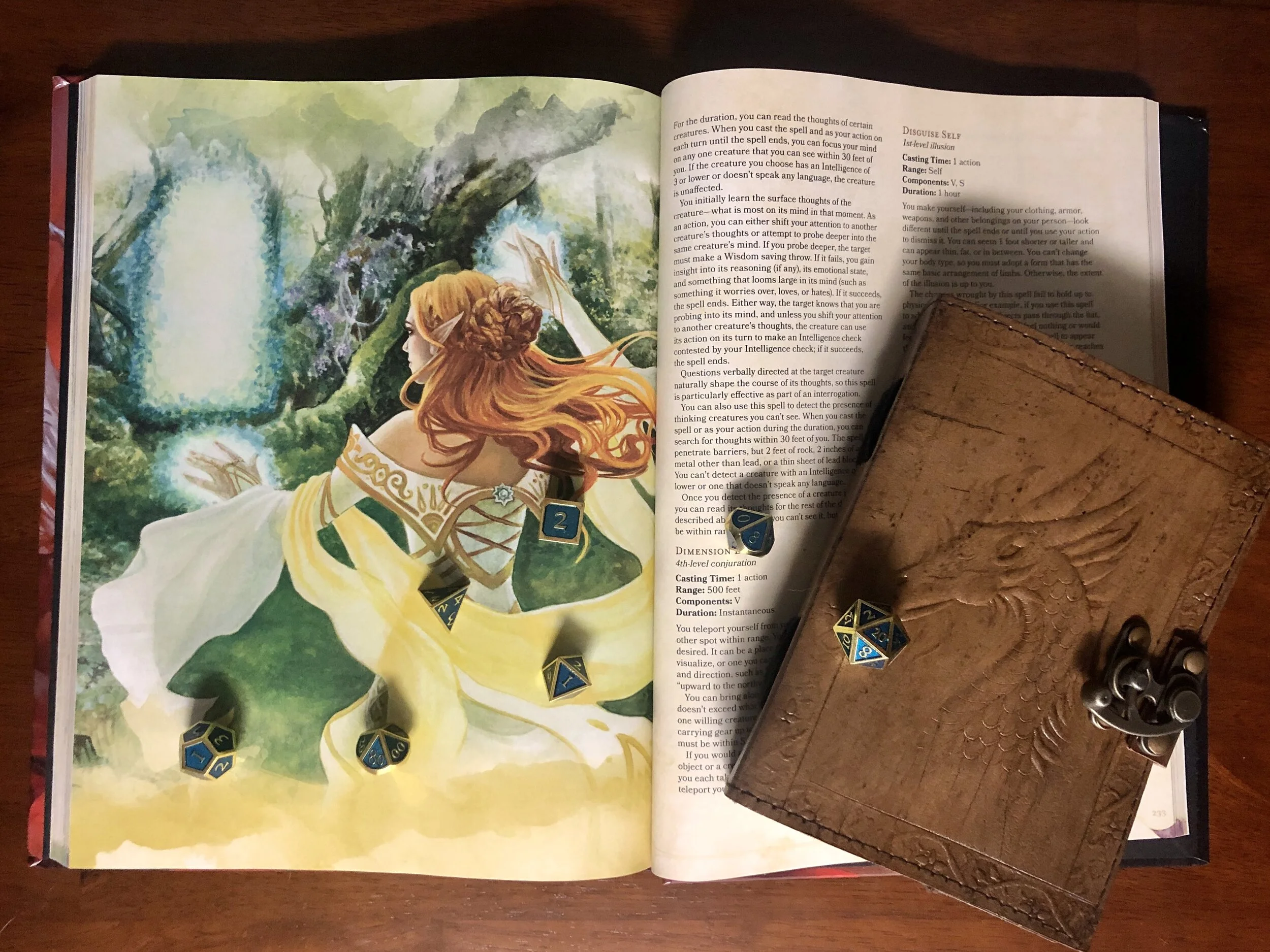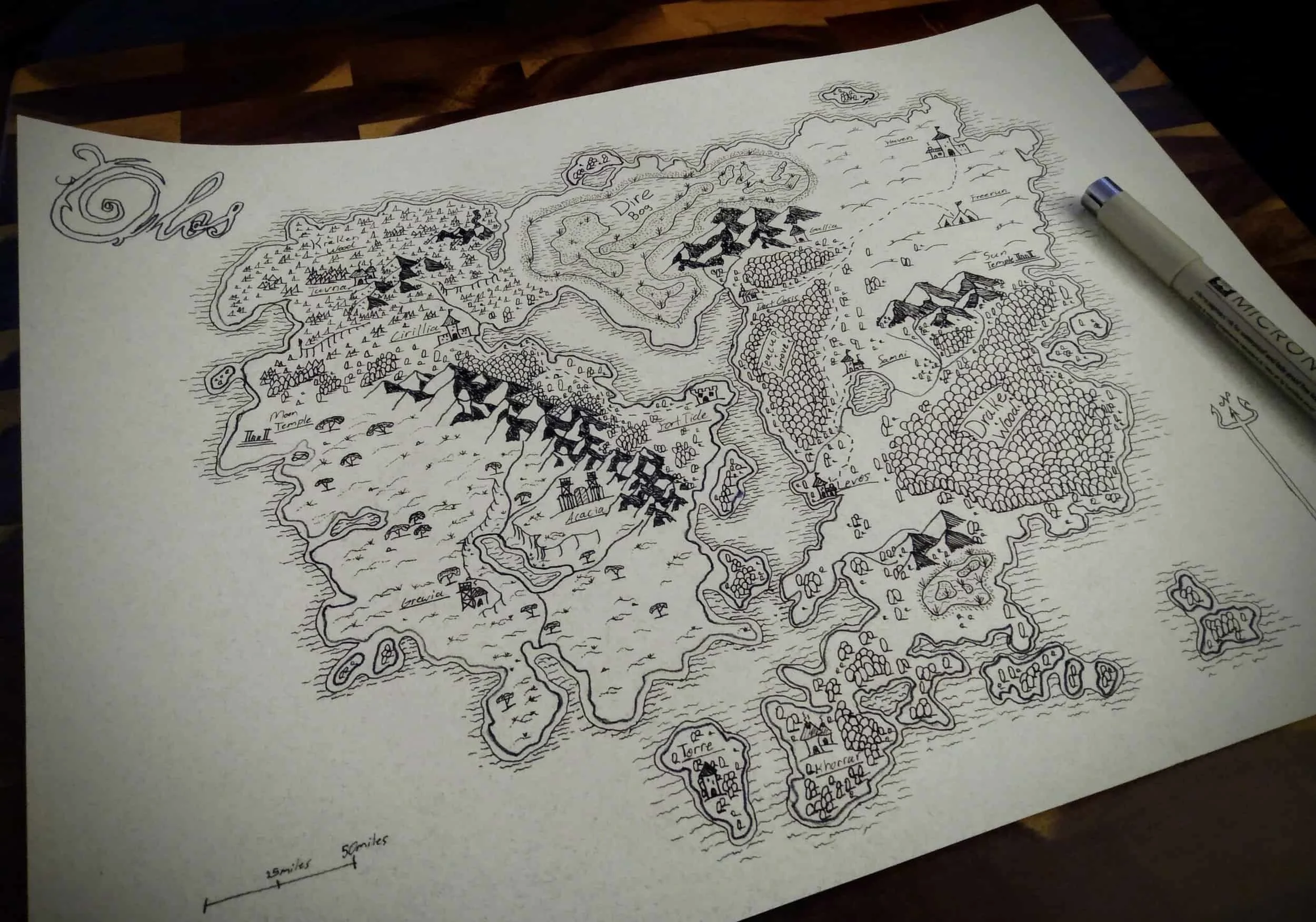Discover the Magic of Dungeons & Dragons Therapy
Dungeons and Dragons as Therapy? Listen, Stranger Things have happened.
While it might seem unconventional, D&D is proving itself to be one of the most engaging and effective ways for kids to practice social and emotional skills in real time. By adventuring through a fantasy setting, players face challenges that mirror real life and practice social and emotional skills they can carry back into their everyday worlds.
Before we get into the details, here are some of the ways Dungeons & Dragons therapy groups can make a meaningful difference for kids.
The Benefits of Dungeons & Dragons Therapy for Kids
One of the cool things about D&D is that players naturally practice a wide variety of skills in a way that doesn’t feel like work. Amazingly, there is research to back this up. Studies have proven that roleplaying game players are more empathetic, less socially anxious, better creative thinkers, and even have stronger morals than their non-roleplaying peers.
D&D therapy groups can use what’s already embedded in the game to encourage social and emotional growth without veering into “after school special” territory.
D&D Therapy gives kids a chance to:
Practice social skills in a fun, low-stress environment
Improve self-awareness and impulse control
Build frustration tolerance and cultivate a growth mindset
Boost self-confidence and self-esteem
Learn to manage anxiety in a setting where mistakes are allowed
Discover a social, creative outlet that isn’t a video game
Get support from peers who share their interests
What is Dungeons & Dragons? Is This the Game They Play in Stranger Things?
If you’re new to Dungeons and Dragons, here’s a quick overview of how the game works. Dungeons and Dragons, often called “D&D” for short, is a collaborative storytelling game. Players take on the personas of hero characters in a fantasy world. Guided by a facilitator, they must work together as a team to solve puzzles, collect treasure, or defeat bad guys.
D&D is different than a board game because there is no set path for players to take. Characters don’t just progress along spaces on a board. Instead, the players improvise to create a story together. Their choices affect what happens next. It’s sort of like a choose-your-own-adventure novel that’s happening in real time.
First, the facilitator—called the Dungeon Master—describes the scene. Next, players get to decide what their character would do in the given situation. Dice rolls add an element of unpredictability to the game: roll well, and your character succeeds! Roll poorly, and…they might find themselves in trouble.
D&D is enjoying a “moment” right now, fueled by Netflix’s hit show, Stranger Things, popular podcasts like Dimension 20 and Critical Role, and the recent D&D-themed movie, Honor Among Thieves. A new, diverse, and youthful generation of players is discovering a game that many of us once assumed was just for our Dads and their friends.
Why D&D Works So Well in Therapy (Especially for Kids)
This fun, imaginative game is a natural fit for kids’ and teens’ therapy groups. Why is that? For one, it’s not a competitive game. You can’t really win or lose, and there’s no such thing as a “right” or “wrong” choice. D&D therapy group members work together, rather than against each other. This can be freeing to kids who always want to do the right thing, or who are sensitive to losing.
“Want to summon a herd of unicorns to defeat an evil wizard? Give it a try. Want to play a glamorous elf with a dark secret who can speak to woodland creatures? That is totally possible.”
Dungeons & Dragons therapy is, essentially, play therapy all grown up. Tweens and teens need age-appropriate play to release stress, practice life skills, and bond with friends. D&D provides a creative space where you can do and be pretty much anything you can imagine. Want to summon a herd of unicorns to defeat an evil wizard? Give it a try. Want to play a glamorous elf with a dark secret who can speak to woodland creatures? That is totally possible.
D&D is a Natural Fit for Neurodivergent Kids
Research into roleplaying games has proven what we already know: D&D an awesome way for neurodivergent and 2E kids to make friends. Jumping into an adventure together helps players get to know each other quickly, and cuts out the need for awkward small talk. Having a predictable set of social rules to follow is comforting and reduces anxiety about socializing.
Perhaps this is why autistic players have reported improved communication skills, more friendships, and better quality of life after playing roleplaying games.
In fact, many neurodivergent kids are naturally drawn to D&D. And for good reason: the game plays to the strengths of autistic and ADHD players. Although the game is structured, players have plenty of autonomy and are encouraged to make creative, out-of-the-box decisions—a strength many ADHD children naturally bring to the table.
Dungeons and Dragons also contains a nearly infinite amount of lore: autistic players who find joy in researching their special interests often become valued teammates, because their in-depth knowledge of the game is an asset to the group.
Elves, Dragons, and Social Skills: A Game with SEL Benefits
D&D is a great fit for kids’ group therapy because you can’t help but practice social skills as you play. It's more interesting than reading a worksheet or roleplaying with a therapist. D&D helps kids develop social skills with the people that matter most—their peers. Because it’s fun and game-based, there isn’t a lot of pressure to get things exactly right.
When a child plays D&D, she’s literally putting herself in someone else’s shoes. This helps to build empathy, which is critical for developing strong social skills. It also gives kids a chance to try out new ways of interacting with other people. Playing a character gives kids freedom to do and say things that would be too scary in real life.
A shy child may have trouble introducing herself to strangers. But, if she’s playing a swashbuckling heroine, she might discover it's not so hard after all. With a little practice, it becomes easier and easier to talk to strangers outside of the game, too! The social skills kids discover through game play can be applied to their day-to-day lives.
How My Dungeons & Dragons Therapy Groups Work
I’m a drama therapist and a CBT enthusiast, so my D&D therapy groups focus on helping kids develop real-world social and emotional skills through fantasy and roleplay. Playing a D&D character is a lot like acting: the situations may be imaginary, but the feelings are very real.
Kids get to experiment, make choices, and try things they might never attempt in real life, all while learning how to be supportive teammates. Meanwhile, we can alter the storyline, add plot points, and even introduce characters designed to help kids meet their therapy goals.
This creates rich opportunities for growth, while keeping the game fun—because enjoyment is the true “secret sauce” of D&D as therapy.
A typical session might follow this structure:
Group check-in
Recap of the plot so far
Active gameplay (including scenarios to target therapy goals)
Wrap-up (celebrating specific accomplishments of the day)
In-Person D&D Therapy for Charlotte and Lake Norman Kids
For hands-on support, children in the Charlotte area can join Roll Models, a D&D therapy group for kids ages 10-13. A joint project between my practice and Joey Schnople Counseling, group members meet weekly in our Davidson, North Carolina office.
Roll Models is an ideal fit for players looking for alternatives to traditional talk therapy to tackle goals like impulse control, self-confidence, and social skills practice.
What to Expect:
Two licensed therapists in every session (one guiding the game, one providing individualized support)
Parent consultations to discuss goals and progress
Storylines designed to help participants practice skills and reach their goals
Targeted help for kids struggling with focus or emotion regulation
Inclusive Online D&D with Young Dragonslayers
Not every kid needs therapy to reap the benefits of playing D&D. Some just need a supportive place to build confidence in their social skills and play with peers who share their interests.
For families looking for inclusive, non-clinical D&D games, I also run Young Dragonslayers. These online adventure groups are available to kids and teens nationwide. Games are supervised and led by helping professionals, and encourage deeper friendships and social skills practice than your average online class.
What to Expect:
Adult supervision from helping professionals (often in education or healthcare)
Close vetting of all participants to ensure safety
Handpicked, intentional groups based on age, interests, and personality to encourage social success
Inclusive for neurodivergent and LGBTQ+ players
Dungeons & Dragons Therapy FAQ
-
D&D therapy groups can help many common mental health concerns like anxiety and depression. They’re especially good for developing social and emotional skills, such as:
emotion regulation
flexible thinking
frustration tolerance
turn-taking
verbal and nonverbal communication
empathy and perspective taking
self-esteem and self-confidence
-
Not at all! Most therapy groups (including mine) are designed to welcome total beginners to the game. Both my in-person therapy group and my online recreational games are open to players of all experience levels.
-
Currently, our in-person therapy group in Davidson is open to players ages 10-13. The online recreational groups at Young Dragonslayers serve ages 10-18.
-
Groups range in size from 3 to 6 players. This makes it easier to form close relationships and gives everyone a chance to enjoy the spotlight now and hten.
-
All my groups—both therapy and recreational—meet for 90 minutes, once a week. This seems to be the sweet spot for kids, where we can make good progress without losing focus.
-
Roll Models, the in-person D&D therapy program, meets at 442 South Main Street in Davidson, North Carolina, just north of Charlotte.
Young Dragonslayers, the recreational program, is exclusively online using Zoom or Discord. These games are most accessible to kids in Pacific, Central, Mountain, and Eastern time zones. -
Our Roll Models D&D Therapy groups are $80 per session.
-
True therapy groups are typically at least partially reimbursable. Roll Models, our in-person D&D therapy program, is FSA/HSA eligible and you may be able to submit for out-of-network reimbursement from your insurance provider.
Recreational games (like the ones at Young Dragonslayers) do not qualify for insurance reimbursements. -
Roll Models, our in-person therapy groups, are helpful for Charlotte-area kids looking for face-to-face interaction or hands-on support. We’re able to coach kids through moments of dysregulation since we have multiple therapists on deck.
Young Dragonslayers is a great fit for kids who don’t live locally. They’re intended for kids looking for an inclusive, safe place to play D&D. These groups offer more support than your average online class, but are not intended to be therapy—kids join for all kinds of reasons.
-
That’s totally normal! We meet all interested players (and their parents) in advance to answer questions about the program and hopefully alleviate some of the anxiety that comes with trying something new. We find that new players typically feel like a part of the group within a few sessions.
Join Us for Dungeons and Dragons in Davidson, NC or Online!
Whether your child is ready for an in-person therapy quest here in Davidson, or wants to join a supportive online group from anywhere in North America, we have a seat waiting for them at the gaming table. And if we don’t…we’ll help them find the right place to play!
Click a button below to choose your adventure. And if you have any questions, you can always contact me.




